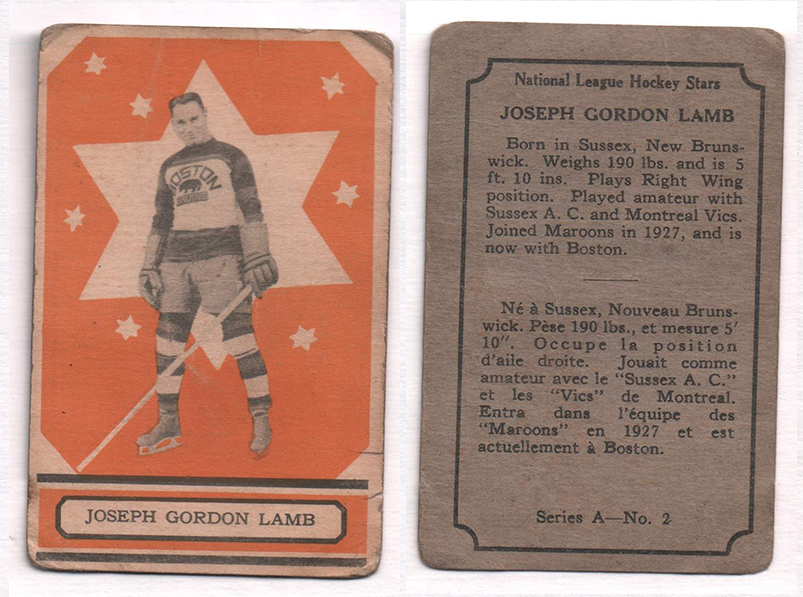Great research seventieslord.

Watson and Maxwell were on my list.

But I passed on Gardner as one of those builder/player picks, important in creating the Montreal Canadiens as a franchise and as a name, even coaching it afterwards. Though he did captain the team in 1913-15 and won the Stanley Cup four years before that, during the 1900-1910 first decade of the century.
I came across Tom Hooper during the ATD but forgot all about him during the ML and AAA drafts. The hero of the upstart Kenora Thistles who challenged the Silver Seven for the Stanley Cup and took it away from the Montreal Wanderers. He then joined the Wanderers for three of their cup defenses in 1908. I didn't draft him because he seemed more remembered as a representative of the little Kenora team David vs .Goliath storyline, and the fact that he had under two years experience outside of that small town.
George Richardson was a WWI war hero (read: died in combat) and so that boosted his worth in the eyes of the HHOF committee it seems, remembered as a hero "in sport and war". Three-time university champion, he was "a clean, gentlemanly player, a fine stickhandler, and prolific scorer" on left wing (NOT defense) and kuddos to him for impressive goal totals in matches against the McGill Redmen and Ottawa Silver Seven. A three-year OHA champion as well, the star of Kingston for sure.
Frank Rankin played amateur hockey for the St. Michael's Majors, twice making the Allan Cup finals but never winning the cup. He is remembered for scoring 20 goals in 5 games, and for later coaching the 1924 Olympic gold medal team.

dunno what to make of him.
I had no idea about
Shorty Green, the first to ever score a goal in Madison Square Gardens!

as captain of the Hamilton Tigers club that became the New York Americans, won the 1919 Allan Cup, known as "small, tough, and aggressive" and lookin' like Daniel Day Lewis:

I also am happy to here learn about
Frederick Whitcroft, two-time top scorer of the Alberta pro league as an Edmonton Eskimo, he was renowned for his talent, getting very good money contracts to play short term for Kenora and Renfrew. He "possessed a solid, compact frame that would have better suited a defenseman, but he also possessed great speed, on-ice agility, and a gift for nifty stickhandling-- the tools of a prolific scorer. As a result, Whitcroft often played the middle ice positions of cover point and rover." A star of his era but not a guy who transcended the game of his time, with limits in his perfomances and a lack of gaudy play of some other HHOFers of his era. After he retired he was president of amateur hockey in Vancouver.

 All shortlisted guys I was hoping some team would pick.
All shortlisted guys I was hoping some team would pick.










 Recorded three straight game-winning goals this season on 11/3 vs. PIT, 11/6 vs. NYR and 11/10 vs. NJD. It was the first time an Islander accomplished the feat since Bryan Trottier in January of 1982.
Recorded three straight game-winning goals this season on 11/3 vs. PIT, 11/6 vs. NYR and 11/10 vs. NJD. It was the first time an Islander accomplished the feat since Bryan Trottier in January of 1982. dunno what to make of him.
dunno what to make of him. as captain of the Hamilton Tigers club that became the New York Americans, won the 1919 Allan Cup, known as "small, tough, and aggressive" and lookin' like Daniel Day Lewis:
as captain of the Hamilton Tigers club that became the New York Americans, won the 1919 Allan Cup, known as "small, tough, and aggressive" and lookin' like Daniel Day Lewis:

 "Moose" was a first team all-star in the OHA before WWI and twice again in 1922 and 1923 as he led his team to two Allan Cups, then won the gold medal in the 1924 Olympics, a cakewalk in which he easily scored 37 goals in 5 games against vastly inferior international competition. He turned down several NHL offers, including a huge sum in 1925 of $10,000, opting instead to hang up his skates and join the business world at age 27. He is in the HHOF and the IIHF hall of fame.
"Moose" was a first team all-star in the OHA before WWI and twice again in 1922 and 1923 as he led his team to two Allan Cups, then won the gold medal in the 1924 Olympics, a cakewalk in which he easily scored 37 goals in 5 games against vastly inferior international competition. He turned down several NHL offers, including a huge sum in 1925 of $10,000, opting instead to hang up his skates and join the business world at age 27. He is in the HHOF and the IIHF hall of fame.